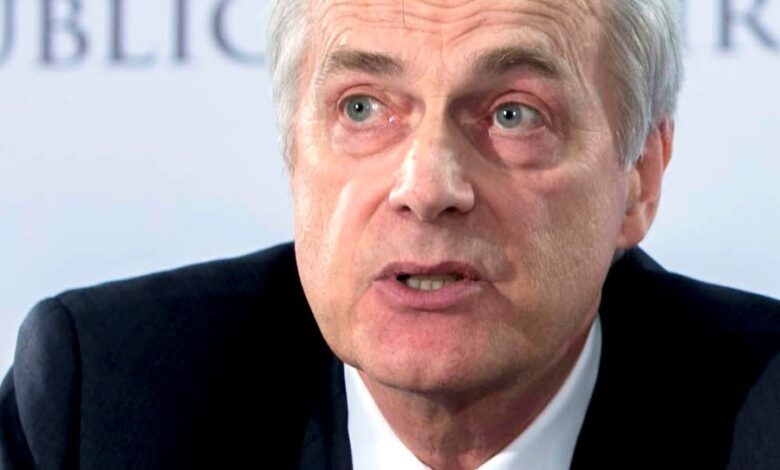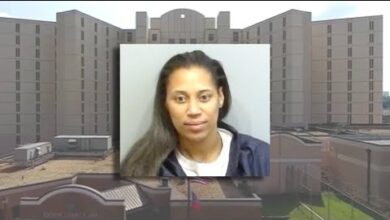Thirlwall Inquiry: failing NHS managers should be ‘disqualified’

Senior NHS managers should be “disqualified” from working at other trusts if they are found to fail in their duties, an inquiry into the crimes of Lucy Letby has heard.
Barrister Sir Robert Francis KC has reiterated calls for regulation of NHS leaders, to ensure greater accountability for individuals in these posts.
“There ought to be a means of disqualifying someone from being the chief officer or senior director or a director of an NHS organisation”
Robert Francis
The comments came during an evidence session at the Thirlwall Inquiry, which is examining how Letby was able to harm babies in her care at the Countess of Chester Hospital.
The former neonatal nurse is currently serving multiple whole-life prison sentences for the murder of seven babies and the attempted murder of seven others between 2015 and 2016.
Following Letby’s conviction, concerns were raised about whether poor management at the trust allowed the crimes to go on for as long as they did.
It has led to questions about what accountability exists for senior NHS managers to ensure they are fulfilling their duties.
Sir Robert, who specialises in medical law and led the report into serious care failings at the former Mid Staffordshire NHS Foundation Trust, told the inquiry that he would like to see independent regulation of NHS managers.
He said: “The one group of people who don’t appear to be subject to regulations at all are the senior managers and that has a number of consequences.
“One is that there is no common standard for, or qualification required to be, for instance, the chief executive of a large hospital trust.”
Sir Robert noted that registered healthcare professionals, including nurses, who pursue senior management in the NHS are accountable to their regulator, and can be struck off for poor practice.
However, non-clinical NHS managers are not subject to such scrutiny.
“There is no such procedure for the non-clinical manager,” he explained.
“The result, I’m afraid, is that people who haven’t done terribly well, one way or the other, may leave one job and you then find they crop up in another job because there is no overall certification as to whether someone is a fit and proper person at any given time to do these roles.
“So I am in favour of there being a system of regulation that at least has that element to it.
“I think there ought to be a means of disqualifying someone from being the chief officer or senior director or a director of an NHS organisation.”
The government confirmed in its opening statement to the Thirlwall Inquiry that it had been exploring options for regulating senior NHS managers, in the wake of the Letby conviction.
As part of this, it said full statutory regulation of NHS managers would be considered.
This would require senior managers to join a register which states that an individual is qualified and suitable to practise a particular profession.
Sir Robert noted that many senior managers “would actually welcome” these measures, which he said would give them “a professional status”.
“To actually have more of a certification that you are a fit and proper person would actually be a protection,” he argued.
During the evidence-giving session, Sir Robert noted the “large number of regulators” which oversee NHS organisations and the professionals who work within them.
“I think many frontline workers, principally I would say doctors and nurses… find that puzzling and intimidating and leaves them sometimes uncertain as to where they should go if they have concerns to raise,” he explained.
“So it is a very complicated picture for a busy professional to get their head round if a crisis develops.”
“You need a system which welcomes people raising concerns and you need to have principles of good practice”
Robert Francis
Senior managers were accused during the Letby trial of failing to act when clinicians first raised concerns about the former neonatal nurse.
Following her conviction, the parliamentary and health service ombudsman, Rob Behrens, argued that there was a “defensive leadership culture” in the NHS which often prevents staff from being able to raise concerns about colleagues.
This was echoed by Sir Robert during his testimony at the inquiry.
In February 2015, Sir Robert published a Freedom to Speak Up review, which was an independent investigation into the NHS’s culture of whistleblowing and reporting.
He uncovered that many NHS staff were putting off speaking up about concerns because of fear of victimisation, or that their concerns will not be listened to.
Sir Robert told the Thirlwall Inquiry he found “far too many cases” where nurses and doctors had raised concerns and then, instead of the issue being investigated, they would become the subject of investigation themselves.
“So the whole thing would become an issue about looking at the person and their character and their ability rather than looking at the issue that they had raised,” he explained.
“And this seemed to permeate quite a lot.”
Sir Robert made reference to the Bristol heart scandal, where babies were dying at high rates after cardiac surgery at the Royal Bristol Infirmary in the 1990s.
Dr Stephen Bolsin, an anaesthetist at the hospital at the time, raised concerns about high levels or mortality with senior managers at the trust, the NHS, the Department of Health and Social Care and the royal colleges, but was ignored for years.
Whistleblowing meant Dr Bolsin quit his job and never worked in the UK again.
Sir Robert said there were “a number of people who have suffered similar fates and are to this day concerned”.
“You can have rules and regulations about fair treatment of people but again, I’m afraid, this is cultural and you need a system which welcomes people raising concerns and you need to have principles of good practice,” he added.
The Thirlwall Inquiry continues and is expected to hear oral evidence from witnesses until December 2024.
More from the Thirlwall Inquiry







